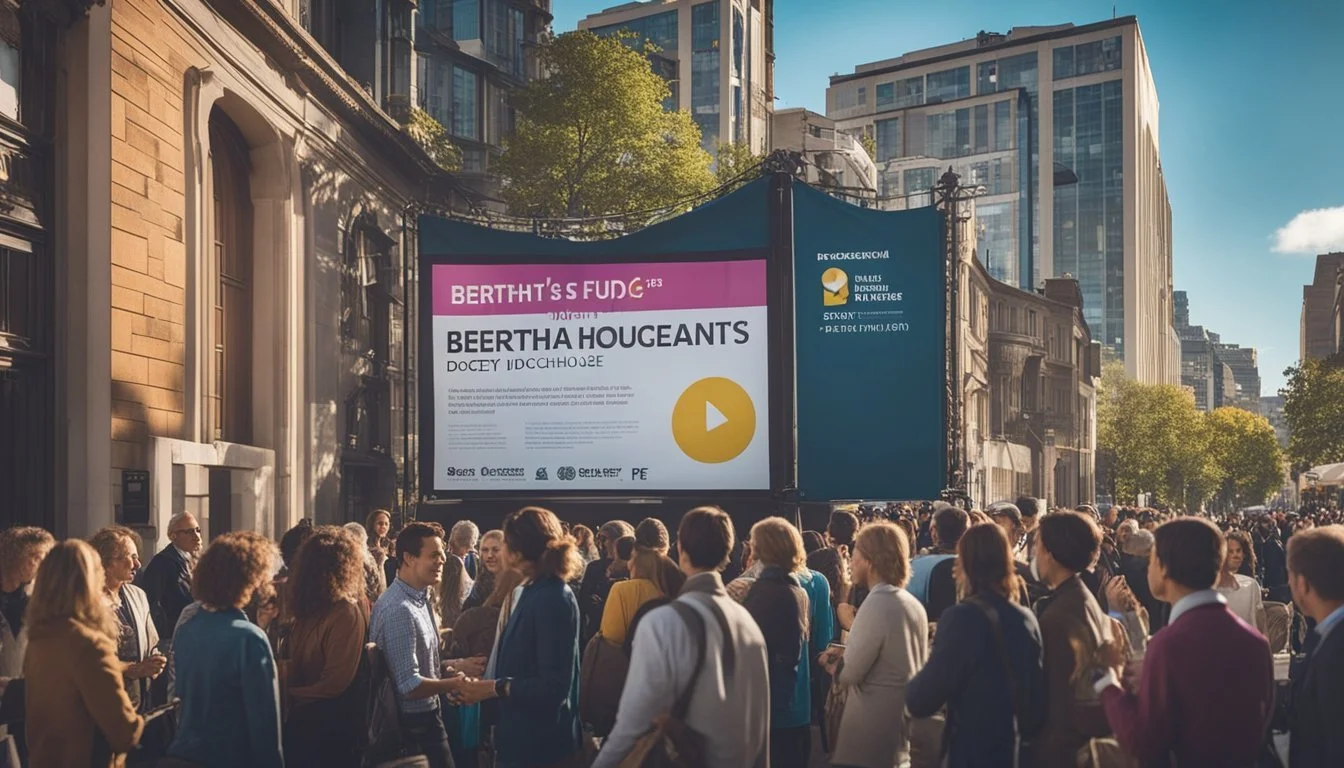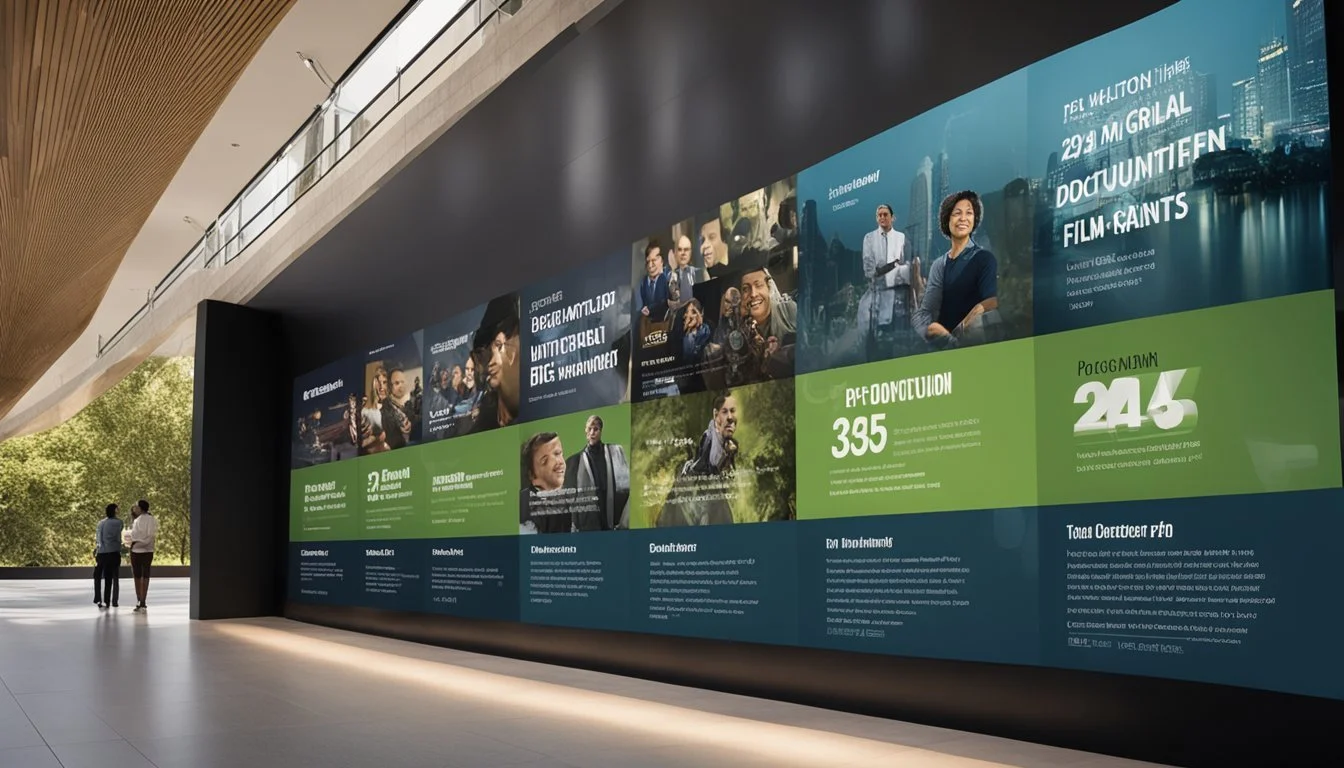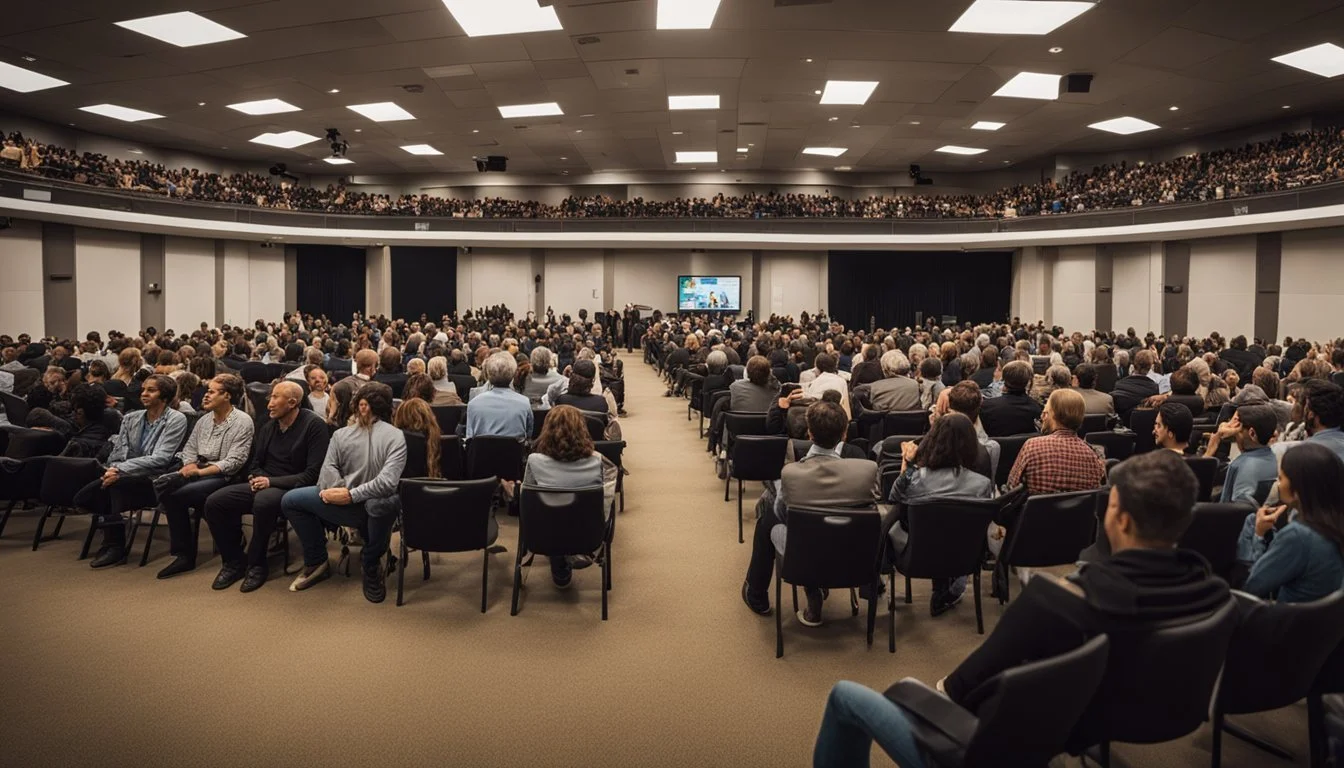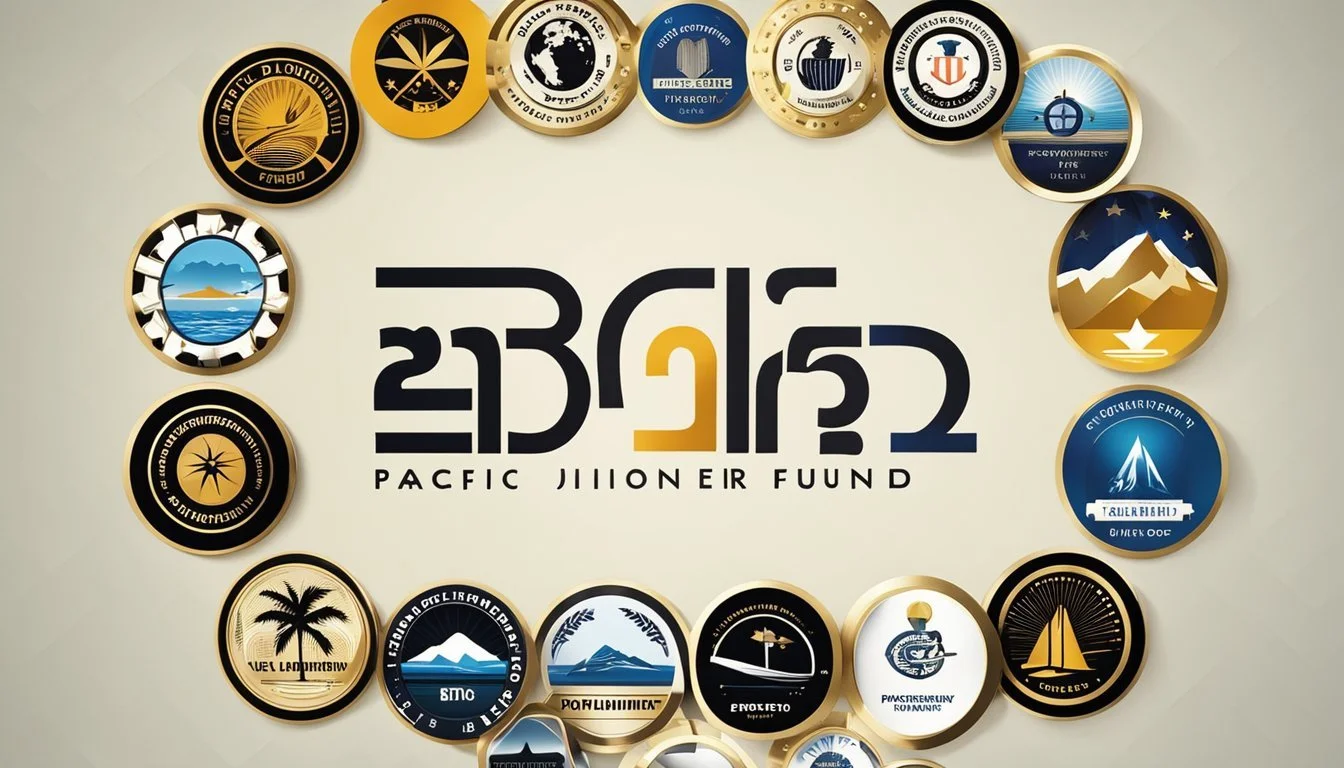21 Film Grants Every Documentary Filmmaker Should Know About
Essential Funding Resources
Securing funding is one of the most critical steps for documentary filmmakers looking to bring their stories to life. Understanding which film grants are available can make or break a project. Various organizations provide financial support to filmmakers, enabling them to focus on creative endeavors without the constant stress of budget constraints.
The landscape of film grants is diverse, offering opportunities specific to different genres, topics, and stages of production. Navigating this landscape effectively requires awareness of the most relevant and accessible grants available today. By leveraging these resources, documentary filmmakers can find the much-needed support to complete their projects and share their compelling narratives with the world.
1) Sundance Documentary Fund
The Sundance Documentary Fund supports independent filmmakers worldwide. Established by the Sundance Institute, it assists in the production of nonfiction films on contemporary themes. This initiative began with funding from the Open Society Foundations.
Filmmakers do not need prior funding commitments to apply.
Applications for the 2024 grant cycle open on June 10 and close on July 15, 2024, at 11:59 p.m. Pacific Time. Applicants will be notified of their status in early 2025. A well-rounded fundraising strategy should be included in the proposal.
The fund offers grants to filmmakers, including those seeking support from foundations, broadcast licensing agreements, private donations, in-kind support, and crowdfunding. The Sundance Institute has a history of supporting diverse voices and innovative storytelling.
Twenty-three projects received grants totaling over $1,000,000 in 2023, demonstrating the significant support provided. This fund serves as a crucial resource for filmmakers aiming to create impactful documentaries.
2) IDA Enterprise Documentary Fund
The IDA Enterprise Documentary Fund is a significant resource for documentary filmmakers. This fund is administered by the International Documentary Association (IDA) and provides substantial support to filmmakers focused on fact-based storytelling.
Since its inception, the fund has aimed to enhance press freedom and integrity in documentary film. It supports projects that retain the filmmakers' independent voices and artistic visions.
In 2024, over $500,000 in grants will be available through the IDA Enterprise Documentary Fund. Filmmakers can submit their applications through a unified Open Call using the Core Application.
The application deadline for non-IDA members is June 25, while IDA members have until July 9 to apply. This fund is instrumental in providing resources to filmmakers outside the United States.
Historically, the fund has supported diverse projects across various countries, including Armenia, Ethiopia, India, Japan, Russia, and the USA. The successful grantees range widely in background, with a high percentage being filmmakers of color and women.
3) Catapult Film Fund
Catapult Film Fund provides crucial development funding for documentary filmmakers. It targets filmmakers with compelling stories and secured access to their subjects.
Grants range from $5,000 to $20,000, helping filmmakers shoot enough initial footage to attract further funding. The fund emphasizes strong storytelling and early-stage project development.
Applicants undergo a two-step process, starting with a Letter of Intent (LOI). Successful candidates are invited to submit full applications. This phased approach ensures projects align with the fund's goals before moving forward.
Catapult's focus is on nurturing new talent and innovative projects. Documentaries funded by Catapult often cover pressing social issues and unique narratives that might otherwise struggle to find funding.
The fund also provides support beyond financial aid, offering mentorship and networking opportunities. This holistic approach helps filmmakers navigate the complex landscape of documentary production.
Overall, Catapult Film Fund is a valuable resource for emerging and seasoned documentarians alike. Its commitment to early-stage funding and project development makes it a cornerstone in the documentary filmmaking community.
4) Chicken & Egg Pictures
Chicken & Egg Pictures provides crucial support for women and gender-expansive documentary filmmakers. They offer funding, mentorship, and industry access to help filmmakers develop their projects.
Their programs aim to shape a more equitable and just world through the power of documentary films. This includes grants for experienced directors during the research and development phases.
Chicken & Egg Pictures recently launched a Research & Development Grant, giving $10,000 for research and $20,000 for development. This grant is designed to help filmmakers make substantial progress on their new documentary projects.
In addition, the organization awards grants through its (Egg)celerator Lab program, which provides $40,000 each to ten feature documentary film projects. The focus is often on first- or second-time directors, helping them to advance their careers.
Chicken & Egg Pictures emphasizes the importance of funding, mentorship, and access to industry resources, making significant strides in addressing the gender imbalance in the documentary filmmaking industry. Their efforts aim to provide women and non-binary filmmakers with the tools needed for successful and impactful storytelling.
5) Ford Foundation JustFilms
Ford Foundation JustFilms is dedicated to funding documentary filmmakers who focus on social justice topics.
As part of the Creativity and Free Expression program, JustFilms plays a critical role in supporting stories that address inequality and promote social change.
JustFilms has allocated significant funds to documentary projects. For instance, they invested over $4.2 million to support 59 films in 2023.
These grants help filmmakers from the United States and the Global South.
Ford Foundation emphasizes intersectional and BIPOC content, ensuring diverse voices are heard.
Since its inception, JustFilms has been one of the largest documentary funds worldwide, with impactful investments in thousands of projects.
This commitment demonstrates Ford Foundation’s ongoing effort to harness the power of storytelling for social justice and artistic expression.
6) Fledgling Fund
The Fledgling Fund has established itself as a noteworthy supporter of documentary filmmakers.
It focuses on projects that address complex social issues and aims to educate and mobilize audiences.
The fund has backed over 400 documentary projects between 2010 and 2019.
They seek proposals with a clear commitment to making a social impact.
Successful applicants often demonstrate a well-thought-out plan, even if not all aspects are fully developed.
The fund partners closely with filmmakers to realize their vision and maximize the social impact of their projects.
7) Doc Society's Bertha DocHouse Fund
Doc Society's Bertha DocHouse Fund is managed in collaboration with the British Film Institute (BFI). Since 2018, this fund has supported documentary filmmakers working on feature-length and short films.
Filmmakers can receive grants of up to £150,000 per project. This funding aids in development, production, and completion stages of the documentaries.
The fund is open to both UK-based filmmakers and international applicants. It aims to promote diverse voices and innovative storytelling in the documentary genre.
Applicants are assessed on criteria such as originality, potential impact, and artistic merit. The goal is to encourage documentaries that can open dialogue and reflect a broad array of perspectives.
Professional development opportunities are also a part of this fund, offering filmmakers additional support and resources. This comprehensive approach ensures that funded projects can reach their full potential.
By participating in Doc Society's Bertha DocHouse Fund, filmmakers gain valuable financial support and access to a community of like-minded professionals.
8) MacArthur Foundation
The MacArthur Foundation has long been an influential supporter of documentary filmmaking. Established in 1978, it provides grants to projects that cover pressing social issues. Since its inception, the foundation has funded over 300 documentary films.
Grants offered by the MacArthur Foundation are highly competitive and aimed at independently produced film and video projects. These grants often support documentaries addressing a wide range of topics, including racial inequality, immigration, and mental health.
One of the foundation's key focuses is to foster a deeper understanding of complex societal challenges. Recent projects receiving grants have tackled subjects like the Syrian refugee crisis and income inequality in the United States.
The application process for these grants typically involves an open call. Deadlines and specific guidelines are announced on the foundation’s website. Filmmakers are encouraged to present well-researched proposals that highlight the significance and potential impact of their work.
Financial support from the MacArthur Foundation can significantly boost the production quality and reach of documentary films. Winning a grant not only provides monetary assistance but also adds considerable prestige to a project, making it easier to attract further funding and distribution opportunities.
9) Open Society Foundations
Open Society Foundations (OSF) is a major supporter of documentary filmmaking, providing significant funding for projects that address pressing social issues.
Founded by George Soros, OSF has a long history of backing initiatives that promote transparency, justice, and open society values.
Filmmakers who focus on human rights, freedom of expression, and social justice themes may find this grant particularly fitting.
The foundation offers a variety of grants, primarily aimed at fostering independent media and documentary film productions.
Through partnerships with organizations like the Sundance Institute, OSF amplifies the impact of documentary films.
Grantees often receive not only financial support but also access to valuable networks and mentorship.
Applications typically require detailed project proposals highlighting the film's relevance to OSF's mission.
Ensuring a strong alignment with the foundation's goals can significantly enhance the chances of securing funding.
10) Tribeca Film Institute
The Tribeca Film Institute (TFI) is an influential organization in the documentary filmmaking space. Founded by Robert DeNiro and Jane Rosenthal following the September 11 attacks, TFI seeks to inspire and connect filmmakers with the resources they need.
TFI provides various grant opportunities, including the TFI Documentary Fund. This fund supports feature documentaries at different stages of production with grants ranging from $25,000 to $50,000.
The Gucci Tribeca Documentary Fund is another significant initiative. Established in 2008, it has distributed over $1.5 million to independent filmmakers, contributing to the creation of 105 documentaries.
TFI also collaborates with organizations like ESPN and A+E to offer specialized programs and workshops. These partnerships help in offering targeted grants and mentorship opportunities.
Through these initiatives, TFI plays a crucial role in nurturing a diverse and inclusive community of filmmakers worldwide. By providing financial support and networking opportunities, TFI helps filmmakers bring their stories to a broader audience.
11) Firelight Media
Firelight Media champions documentary filmmakers, particularly those from underrepresented communities. It offers multiple programs aimed at providing comprehensive support to these storytellers.
The Documentary Lab is a cornerstone program, offering an 18-month fellowship to nurture first or second-time feature filmmakers. This program focuses on professional development through retreats and customized support.
Firelight Media also administers the Impact Campaign Fund. This fund addresses financial gaps in audience engagement and impact-related projects, specifically for filmmakers from communities of color.
Additionally, Firelight Media has consistently announced annual grantees. These initiatives ensure that documentary creators have the resources and mentorship needed to succeed.
Support from Firelight Media extends beyond mere funding, including mentorship and creative development. This holistic approach helps filmmakers navigate the complexities of nonfiction storytelling.
Being over two decades old, Firelight Media remains a pivotal institution in the documentary film landscape. Its programs reflect a commitment to fostering diverse voices and ensuring their stories reach wide audiences.
With a track record of successful projects, Firelight Media continues to make significant contributions to the art of documentary filmmaking.
12) Gucci Tribeca Documentary Fund
The Gucci Tribeca Documentary Fund supports feature-length documentaries addressing critical social issues worldwide. Established in 2008, this fund has provided over $1.5 million in grants to independent filmmakers.
The fund focuses on films in production or post-production stages without specific premiere dates. It emphasizes projects that humanize significant issues through powerful storytelling.
A notable aspect of this fund is its commitment to amplifying women's voices. Approximately 70% of the grants have been awarded to women filmmakers or films highlighting women's stories.
Past grantees include impactful documentaries like "Black Mothers," "King Coal," "After Sherman," and "Rojek." Each project supported aims to act as a catalyst for change in the filmmaker's community and beyond.
By providing finishing funds, the Gucci Tribeca Documentary Fund ensures that important stories make it to the screen, reaching a broader audience. This makes it a vital resource for documentary filmmakers seeking support for their socially relevant projects.
13) National Endowment for the Humanities
The National Endowment for the Humanities (NEH) is a powerhouse for funding documentary projects. Established in 1965, NEH has supported over 64,000 projects. These projects must be rooted in humanities scholarship and showcase a thoughtful approach.
NEH grants typically cover radio programs, podcasts, documentary films, and film series. The aim is to engage general audiences with creative and appealing humanities content. Applications are open to a wide range of project types.
Applicants must demonstrate solid grounding in humanities scholarship. This ensures the projects are not only engaging but also informative and educational.
Strong emphasis is placed on clear and coherent project narratives. This clarity helps reviewers understand the project's scope and impact.
14) The Redford Center Grants
The Redford Center Grants program has been a pivotal resource for independent environmental documentaries since its inception in 2016. It is one of the few initiatives exclusively funding and supporting this genre.
The grants are open to environmental nonfiction feature films or docuseries at any stage of development, production, or postproduction.
Selected films receive a first-year $25,000 grant to support production and impact efforts. In the most recent cycle, twelve projects were selected from over 250 applicants across 20 countries.
The Redford Center has a track record of producing award-winning documentaries and supporting numerous film and media projects. Recipients benefit from not just financial support but also additional services aimed at amplifying their environmental message.
Applicants have a specified window to submit their projects; for 2024, this period runs from April 4 to May 12. This program underscores the importance of storytelling in driving environmental change by providing crucial support to filmmakers.
15) California Documentary Project
The California Documentary Project (CDP) stands out as a crucial grant program for documentary filmmakers interested in exploring the diverse narratives of California. Managed by California Humanities, this program has been a prominent supporter of high-quality productions for nearly 50 years.
CDP grants fund film, audio, and digital media projects that reflect the state's complexity. Filmmakers are encouraged to use humanities to provide context and depth, ensuring stories from every corner of California are authentically told.
The competitive nature of the CDP grant means only the most compelling and enriching projects receive funding. These grants focus on themes and stories significant to the state, aiming to highlight issues that resonate not just regionally, but potentially on a wider scale.
Past recipients, such as the FAR EAST L.A. project, demonstrate the program’s commitment to exploring historical and cultural narratives within California's communities. Projects funded by the CDP often shine a light on intersectionality and social dynamics unique to California.
By maintaining high standards and encouraging thought-provoking content, the California Documentary Project continues to play a vital role in the documentary filmmaking landscape of the state.
16) ITVS Open Call
ITVS Open Call provides independent documentary filmmakers with co-production funding to help complete their projects. The funding can reach up to $400,000 for feature-length documentaries.
The documentaries can cover any subject, viewpoint, or style, as long as they are already in active production. Applicants must provide a work-in-progress sample to demonstrate their project's current status.
Open Call funds are restricted to standalone documentaries intended for public television. Short web series, vertical video series, and documentary series are not eligible for this grant.
ITVS also offers a separate Short Form Open Call for documentaries up to 25 minutes in length, with funding up to $40,000. This is aimed at completing short documentaries that can stand alone as independent works.
17) Pacific Pioneer Fund
The Pacific Pioneer Fund supports emerging documentary filmmakers based in California, Washington, and Oregon. Established in 1979, this private foundation has been providing grants since 1980.
Eligible filmmakers must have several years of practical film or video experience. It is a one-time grant, meaning recipients cannot apply again. Rejected applicants must wait at least one year before reapplying.
Grants range from $1,000 to $10,000. These funds help with various stages of production, offering crucial support for documentaries that might otherwise struggle to secure financing. The grant's exclusive focus on West Coast filmmakers distinguishes it from other funding sources.
Nancy Sloss, one of the fund's benefactors, was a documentary filmmaker herself. This history underscores the fund’s dedication to nurturing new voices in documentary filmmaking.
18) Pare Lorentz Documentary Fund
The Pare Lorentz Documentary Fund, established by the International Documentary Association, began in 2011. It is named in honor of the influential American documentary filmmaker Pare Lorentz, known for his work during the 1930s and 1940s.
The fund provides annual grants totaling $115,000 to support the creation of original, independent documentary films. These grants are focused on production and post-production stages.
Since 2023, the fund has expanded to include Immersive Nonfiction projects, allowing for a wider range of storytelling formats. The selection criteria emphasize projects that illuminate pressing issues in the United States.
Grants range from approximately $15,000 to $25,000 per project. The International Documentary Association encourages applications from filmmakers worldwide, making it a truly global opportunity.
Each year, the fund targets specific issue areas that were central to Pare Lorentz's own work, ensuring that the supported films resonate with contemporary audiences while honoring his legacy.
19) Creative Capital
Creative Capital supports innovative and adventurous artists across disciplines, including documentary filmmakers. The organization provides not just financial backing but also professional development, networking opportunities, and advisory services.
This grant aims to help creators bring groundbreaking projects to fruition. Applicants go through a rigorous selection process that evaluates originality, feasibility, and potential impact.
One notable advantage is their commitment to funding diverse and underrepresented voices in the film industry. They encourage projects that push boundaries and challenge norms.
Recipients often emerge with strengthened skills and resources, making Creative Capital a significant ally for documentary filmmakers.
20) Film Independent
Film Independent awards over $845,000 in cash and production services to filmmakers each year. These grants support projects at various stages of production.
The organization focuses on helping independent filmmakers advance their work. It also aims to recognize professional achievements in the field.
They offer several specific grants, ensuring that diverse voices in filmmaking are heard. This can include funding for unique, innovative projects.
Interested applicants should know that the competition is fierce. Submissions are evaluated on the quality and creativity of the project.
21) LEF Moving Image Fund
The LEF Moving Image Fund is a vital resource for New England-based independent documentary filmmakers. It provides comprehensive support spanning all phases of production, from the initial stages with higher risk to the final completion.
This program aims to foster the development of new talent in the region. It supports projects that demonstrate excellence in technique and originality of artistic vision. There is a strong emphasis on storytelling abilities.
The funding process involves a peer review panel, ensuring a high standard of projects receiving support. Recently, LEF awarded substantial grants totaling $220,000 to various documentary initiatives, focusing on feature-length works.
The fund is designed to not only support the creation of these films but also assist in the professional growth of filmmakers. By doing so, it helps broaden recognition and support for their work both locally and nationally.
Filmmakers who are interested in the LEF Moving Image Fund should have a compelling narrative and demonstrate technical proficiency. This grant offers a continuum of support, which is crucial for the sustained development of documentary filmmaking in New England.
Understanding Film Grants
Film grants are essential for documentary filmmakers looking to fund their projects. They come in various types, with specific eligibility criteria filmmakers must meet to secure them.
What Are Film Grants?
Film grants are financial awards given to filmmakers to support their projects without the obligation of repayment. They are typically provided by organizations, foundations, and institutions dedicated to the arts and media. These grants help cover costs like production, post-production, and marketing. Unlike loans, grants do not need to be paid back, allowing filmmakers to focus on their creative process.
Types of Film Grants
Film grants can be categorized into several types:
Development Grants: These funds support the initial stages of project development, including research and scripting.
Production Grants: These grants cover the costs of actual filming, such as equipment, crew, and locations.
Post-Production Grants: These are used for editing, sound design, and other post-production activities.
Finishing Funds: These specifically help in the final touches of a project, ensuring the film is ready for distribution.
Some grants are also awarded based on thematic content, such as documentaries focusing on environmental or social issues.
Eligibility Criteria
Eligibility criteria for film grants vary widely depending on the grantor:
Citizenship and Residency: Some grants are available only to residents or citizens of specific countries or regions.
Project Stage: Many grants specify the stage of the project they are willing to fund (development, production, post-production).
Budget Limits: Certain grants are intended for low-budget projects and may impose budget caps.
Subject Matter: Specialized grants target specific types of films, like those addressing scientific, technological, or social themes.
Filmmakers should carefully review the guidelines of each grant to ensure they meet the necessary requirements before applying.
How to Apply for Film Grants
Applying for film grants is essential for securing funding and resources. Key steps include researching relevant opportunities, preparing a strong application, and submitting it effectively.
Researching Opportunities
Identifying the right grants starts with thorough research. Filmmakers should explore various sources, such as industry websites, filmmaker networks, and grant directories. It is crucial to focus on grants that align with the project's theme, genre, and stage of production.
Consider using databases and directories like the NEH Media Production Grants and Pacific Pioneer Fund. Reviewing past projects funded by these grants can provide insights into their preferences and requirements. Keeping a calendar for application deadlines ensures timely submissions.
Preparing Your Application
A well-prepared application includes detailed documentation about the film project. Start by composing a compelling project description that outlines the story, themes, and objectives. Drafting a budget is essential, breaking down costs for equipment, personnel, and locations.
Write a strong proposal to convey your vision. Include a 1-2 page outline covering the plot, key sequences, and tone. Obtain quotes from vendors and potential crew, addressing costs for permits, production insurance, and rentals.
Submitting Your Application
Submission procedures vary, so carefully follow each grant's specific instructions. Digital submissions often require uploading documents through online portals. Double-check that all required materials, such as the proposal, budget, and supporting documents, are included.
Proofread all documents to avoid errors. Keeping electronic copies of each submitted document can help track the application status and provide references for future submissions. Networking with past recipients may also provide useful insights and feedback.















